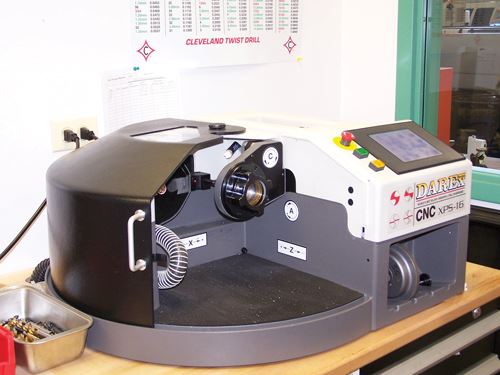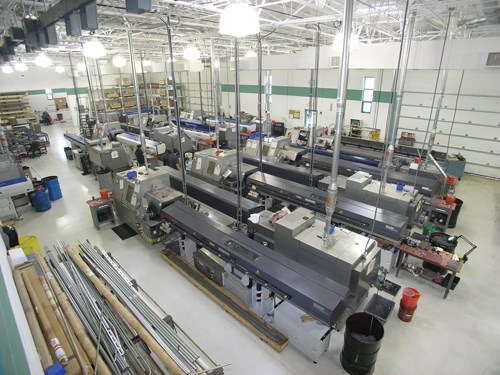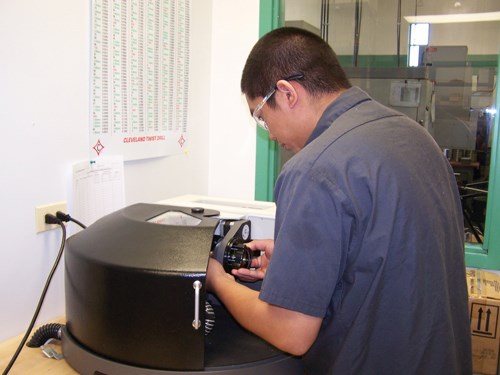Drill Sharpener Helps Shop Hone Competitive Edge
Bringing drill sharpening operations in-house saved both time and money at this Chicago-based manufacturer. However, the sharpener itself, Darex’s XPS-16, provided additional benefits—with high accuracy and consistent results, the machine helped the company maintain precision and quality.
Share





These days, many shops likely find themselves competing for less work. Even in good economic conditions, however, successful manufacturers tend to be those that can process work more quickly, accurately and cost effectively than the competition.
At Chicago-based job shop Swiss Automation, ensuring that employees have the equipment to compete effectively is a critical responsibility of foreman Marc Moran. Having identified long wait times for outsourced drill sharpening as a source of inefficiency, Mr. Moran pressed the company to bring that operation in-house. Darex’s XPS-16 high speed, CNC sharpening machine not only reduced costs and downtime, but also aided the shop’s efforts to maintain precision and quality.
Housing more than 100 employees who perform all types of precision machining, Swiss Automation’s recently expanded 44,000-square-foot facility boasts a variety of production, inspection, programming and toolroom equipment. The 40-year-old shop manufactures primarily hydraulic/pneumatic, electrical, medical and custom components. Commonly machined materials include aluminum, brass, phosphor, bronze, stainless and titanium.
Swiss Automation is busy shop—its 88 CNC Swiss machines run 24 hours a day, 7 days a week. Such a grueling production schedule can take a toll on tooling. Industrial drills, especially, can become dull quickly when continually exposed to excessive heat, tool pressure, lack of lubrication and other elements. Additionally, the shop’s bustling schedule leaves little time to wait for drills to return from independent sharpening services, which could often take as long as 6 weeks. Sharpening drills in-house with the XPS-16 is not only more expedient, but also significantly reduces perishable tooling costs, Mr. Moran says.
The XPS-16 is designed to reproduce the complex, high-tech points found on premium HSS and carbide drills. The machine can sharpen HSS or carbide ranging from 1/8 to 5/8 inch in diameter and from 2 to 8 3/4 inches long at angles ranging from 118 to 150 degrees. Once the user presses the cycle start button, the machine automatically detects the drill’s length, diameter and web thickness with fiber-optic sensors before proceeding to sharpening with superabrasive, plated grinding wheels in one continuous process. For carbide, it includes an automatic cycle to hone the cutting edge. This allows users to choose whether to hone at the end of the cyle or to disable other steps and perform only honing.
Like other CNC machines, the sharpener allows users to make minor geometric adjustments to a drill by "offsetting" the grinding wheel. It also monitors the load on the grinding wheel and adjusts feeds and speeds accordingly to keep the drill cool during the sharpening process. Furthermore, the interface is said to be intuitive enough for operators to learn to use the machine in minutes. "We are saving money on tooling, and our downtime is reduced because all resharpening is done in-house," Mr. Moran says. "The machine paid for itself in a short period of time."
Additionally, the machine enables employees to save individual program files for each drill, which can be defined with either the original geometry or custom geometry. "When the operator needs to sharpen a drill, he or she recalls the custom program for that drill, and within a few minutes, the drill is ground to the pre-determined geometry," Mr. Moran explains. "Consistency from drill to drill, day after day, week after week, is crucial to knowing you will obtain repeatable results in a production environment."
The shop had tried in-house sharpening before with a different machine, but with customers submitting increasingly difficult parts with ever-tighter tolerances, Swiss Automation couldn’t settle for just any sharpener. In addition to its consistent results, the Darex model’s high accuracy aided the company’s efforts to maintain precision and quality.
In fact, the accuracy to which a drill has been ground is equally as important as the sharpness of its cutting edge, Mr. Moran notes. This is especially true for split-point drills. Designed to avoid "walking," a phenomenon in which a drill rotates off-center, these drills can eliminate the need for center-drilling. To get the most out of the tools, however, it is imperative to ensure that the rotational split, depth and center of split are appropriate for the material being drilled.
"The earlier sharpening machine we tried was never perfect. The drill was not on center half the time, and you could never get the split point right," Mr. Moran says. "When resharpening on the XPS-16, we can meet the maker’s standard cutting edge. Sometimes, we actually get better results than the original manufacturer with the Darex machine."
Accurately regrinding split-point drills allows the company to eliminate center drilling operations. This reduces the number of tools used on the job as well as the cycle time. Lower cycle time means more parts can be produced per hour, reducing overall costs and providing a quicker return on investment.
"This machine exceeds our expectations, makes our job easier and faster, and works at a consistent, precision performance level all the time," Mr. Moran concludes.
Related Content
High-Feed Machining Dominates Cutting Tool Event
At its New Product Rollout, Ingersoll showcased a number of options for high-feed machining, demonstrating the strategy’s growing footprint in the industry.
Read MoreThe Future of High Feed Milling in Modern Manufacturing
Achieve higher metal removal rates and enhanced predictability with ISCAR’s advanced high-feed milling tools — optimized for today’s competitive global market.
Read MoreToolpath Improves Chip Management for Swiss-Type Lathes
This simple change to a Swiss-type turning machine’s toolpath can dramatically improve its ability to manage chips.
Read MoreFinding the Right Tools for a Turning Shop
Xcelicut is a startup shop that has grown thanks to the right machines, cutting tools, grants and other resources.
Read MoreRead Next
Setting Up the Building Blocks for a Digital Factory
Woodward Inc. spent over a year developing an API to connect machines to its digital factory. Caron Engineering’s MiConnect has cut most of this process while also granting the shop greater access to machine information.
Read MoreRegistration Now Open for the Precision Machining Technology Show (PMTS) 2025
The precision machining industry’s premier event returns to Cleveland, OH, April 1-3.
Read MoreBuilding Out a Foundation for Student Machinists
Autodesk and Haas have teamed up to produce an introductory course for students that covers the basics of CAD, CAM and CNC while providing them with a portfolio part.
Read More






















.jpg;maxWidth=300;quality=90)













